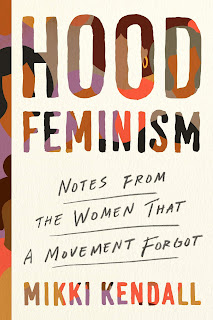Hood Feminism
Book, 2020
Premise - Mikki Kendall writes about the "women that the movement forgot" - Black women. Hood Feminism writes about the feminist issues that most impact women in the "hood", namely poor women of color, specifically Black women, who live in low-income and marginalized neighborhoods. The book uses these feminist issues to contrast from the feminist issues that are most often discussed in White feminist mainstream media.
Review - I'm not exactly sure what I was expecting with this book and why my expectations were only mildly met. I was intrigued by the title alone, as a topic that would interest and inspire me. I enjoy Black, female, intersectional readings. And maybe that was part of my mild dissatisfaction.
The content was excellent, but largely intuitive. I imagine this would absolutely FANTASTIC reading for many White feminists who have never taken the time to consider Black feminist issues. I think in the era beyond George Floyd, the needs of Black feminism are becoming harder and harder to completely ignore, so my thought is that the majority of White feminists by this point are AWARE of the existence of systemic racism within feminism, or at least aware of the claim that it exists, but may not engage with it or understand what that means. As an introductory text, this is amazingly thorough. As a biographical text, it is interesting, too, learning about the personal experiences of an author who I previously had no knowledge of.
But for me that was kind of all it had to offer. Maybe I was just in a mood that was craving more creativity, more profoundness, and that was not the intention of this book whatsoever. She laid out the facts, fair and square. (73/100)
Quote - “Instead of a framework that focuses on helping women get basic needs met, all too often the focus is not on survival but on increasing privilege. For a movement that is meant to represent all women, it often centers on those who already have most of their needs met.”
What to read for - I was most passionate about the emphasis on low-income and poverty, especially in the context of women and motherhood. Food stamps and food quality were so necessary and important. That was one piece of information I took away that felt new to my own ears - the stigmatization of unhealthy foods eaten by people of color. It was especially interesting to hear the criticism of the sugar tax for sodas. The idea that poor people have soda as such a staple drink that's cheaper than clean water, and then we call them out for drinking it too much and gaining weight is... icky. Yes, sugar is terribly unhealthy for us, but it's largely a capitalistic and systemic rather than individualistic problem.
If you liked this book, I'd recommend So You Want to Talk About Race?



Comments
Post a Comment